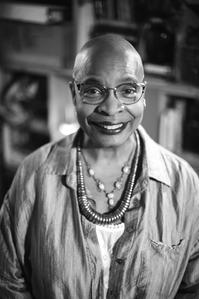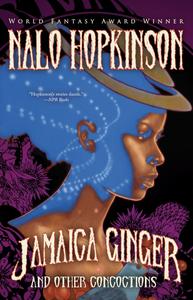
|
|
| photo: David C. Findlay | |
Nalo Hopkinson is a Jamaican Canadian author of science fiction, fantasy, and comics. She's received the World Fantasy Award and the Andre Norton Nebula Award. In 2021, the Science Fiction Writers' Association chose her as that year's Damon Knight Memorial Grand Master, in recognition of her writing, mentorship, and teaching. Her new book, Jamaican Ginger and Other Concoctions (Tachyon, October 29, 2024), is the long-awaited new collection of her deeply imaginative short fiction, taking readers to far-flung futures and fantastical landscapes.
Handsell readers your book in 25 words or less:
In Jamaica Ginger and Other Concoctions you'll find an ocean-going cyborg pig and a gigantic alien skeleton found at an archeological dig here on Earth.
On your nightstand now:
Honestly? I'm currently listening to the audiobook of my most recent novel, Blackheart Man. Hearing it in someone else's words makes it almost like a different novel.
Favorite book when you were a child:
A two-parter: Homer's The Iliad and The Odyssey. My dad had them in English translation from Homeric Greek. I skipped all the "boring" parts and just read the bits with monsters, witches, and ghosts in them. And I rooted for poor Ulysses to finally get home from the wars and be reunited with his wife, Penelope. Though I didn't expect the way he would get rid of all the men who were eating and drinking him out of house and home while they clamored for Penelope to admit her husband was dead and marry one of them. Funny thing is, I tried reading The Iliad a couple of years ago, and I stopped. It was too difficult! As a kid, I didn't get as frustrated at struggling through the language.
Your top five authors:
I don't do hierarchies like that, so I'll just tell you about five authors whose work I really like:
N.K. Jemisin. Her worldbuilding is awesome. You can practically taste the air in her stories. Her characters are surprising and so human, even when they aren't human at all.
Kelly Link. Ever since I first encountered Kelly's quirky, delightfully unsettling fiction, I've been studying how she does it in hopes that I can do it, too.
Samuel R. Delany. Broke my brain open in the best way when I first read his novel Dhalgren. And again when I read his writing about writing. And yet again when I read his autobiographies. Such rich, delicious complexity, like a good plum pudding. So filling. Delany's work made me feel able to live in the world, like I didn't have to become "normal."
Ursula K. Le Guin. Ursula had the knack of making me tear up at a single line of simple prose, even when on the surface it didn't seem to be about anything particularly emotional. A fierce, wonderful woman. I miss her.
Alison Bechdel. I loved the Dykes to Watch Out For comics, and then her graphic memoir Fun Home just blew me away.
Book you've faked reading:
Now it can be told. It was Michael Ondaatje's In the Skin of a Lion. In 2002, CBC Radio in Canada was hosting its first ever Canada Reads programme, in which five Canadian personalities debate five books in order to choose one book for the whole country to read. I was one of the jurors. They told us the titles, but it didn't occur to them to send us the books! That's standard practice in all the literary adjudications I've done. I thought CBC must have some clever plan up their sleeves, so I didn't ask. And it so happened I had read the book I was going to champion (poet George Elliott Clarke's amazing Whylah Falls) so I didn't think anything more of it. But when I showed up on the day of the recording, I discovered they'd just assumed we'd go out and source the books ourselves. Luckily, I had read Margaret Laurence's The Stone Angel in high school. I even remembered bits of the class discussion about it. I'd read and reviewed Margaret Atwood's The Handmaid's Tale in the year it was published, so that one was engraved in memory. That was three of the five titles covered. I had read excerpts from and essays about Rohinton Mistry's A Fine Balance. That left the Ondaatje.
 Then a miracle happened; there was a book sale that morning on the first floor of the CBC building. They just happened to have a copy of In the Skin of a Lion, at a price I could afford! I bought it and skimmed as much of it as I could in the minutes before the recording. It's also such a famous book, especially in Canada, that it gets discussed and written about a lot. So I already knew a little about it. Still; gulp.
Then a miracle happened; there was a book sale that morning on the first floor of the CBC building. They just happened to have a copy of In the Skin of a Lion, at a price I could afford! I bought it and skimmed as much of it as I could in the minutes before the recording. It's also such a famous book, especially in Canada, that it gets discussed and written about a lot. So I already knew a little about it. Still; gulp.
I went into that debate and argued hard for Whylah Falls, worked from my memory of the other two I had read, and listened attentively to what my fellow debaters had to say about the Mistry and the Ondaatje. Ondaatje's novel won, defended enthusiastically by musician Steven Page from the band Barenaked Ladies. I'm pretty sure that CBC Radio now makes sure their debaters have the books well in advance.
Book you're an evangelist for:
Sundown in San Ojuela by M.M. Olivas. It's her first novel, just out from Lanternfish Press. I describe it as a wild ride of brujas and old Aztec gods, chupacabras and haunted houses that gets stranger, darker, and more dire with each turn of the page. The monsters and the heroes are equally, gorgeously terrifying. I was Olivas's mentor when she worked on an early draft of the novel for her undergraduate thesis, and I'm so proud of her!
Book you've bought for the cover:
I know better!
Book you hid from your parents:
Playboy magazine, January 1968 issue. My parents' student boarder left it behind when he left. I found it. I was a kid; I read the comics in it and didn't much care that there were naked people. I figured that was unfathomable big people stuff, so I ignored it. But that's also where I read my first science fiction: Kurt Vonnegut's short story "Welcome to the Monkey House." So I guess that magazine was formative for me.
Book that changed your life:
Come Back to Me My Language by J. Edward Chamberlin. It's a scholarly book that examines the use of anglo-Caribbean vernaculars in poetry. I knew a lot of the poems and poets, and it gave me new ways to think about how I use vernaculars in my prose. That may not sound life-changing, but as a Caribbean person, even one who already had a strong politic and practice using vernaculars, it helped open up and free my language even more in the face of a mainstream which often erroneously believes that using creole in a piece is shorthand for the character being stupid and/or uneducated.
Favorite line from a book:
"There's two kinds of people in the world. Baseball players and cock-suckers. And the baseball players don't hardly ever see the cock-suckers." From The Mad Man by Samuel R. Delany. I like the way it asserts that the everyday acts of people the normative world considers transgressive can often happen right under the noses of the normies.
Five books you'll never part with:
Dhalgren by Samuel R. Delany. That novel showed me what science fiction could do, artistically speaking. It took risks with form and content that thrilled me.
Dance of Knives by Donna McMahon. Fellow Canadian McMahon sets her novel in post-apocalyptic Vancouver when ocean level rise is profoundly changing the landscape. And the silent character of Simon, simultaneously so vulnerable and so prone to outbursts of violence, quite captured my heart.
Always Coming Home by Ursula K. Le Guin. You think it's pastoral, then you realize it's futuristic. An epic story of two communities at war.
Biological Exuberance by Bruce Bagemihl. Nonfiction. If ever I believed that gender and sexuality were neatly divided into two, these cases from all over the animal kingdom told me my work and my life didn't need to be limited that way.
Native Tongue by Suzette Haden Elgin. Another brilliant writer I miss. Before Atwood, Elgin wrote this powerful feminist fallen society novel drawing on her background in linguistics. That book was catnip to me.
Book you most want to read again for the first time:
Pacific Edge by Kim Stanley Robinson. Stan has a way of combining high-tech futuristic stories with a beautiful lyricism and humanity that made this novel so much fun for me to read.

